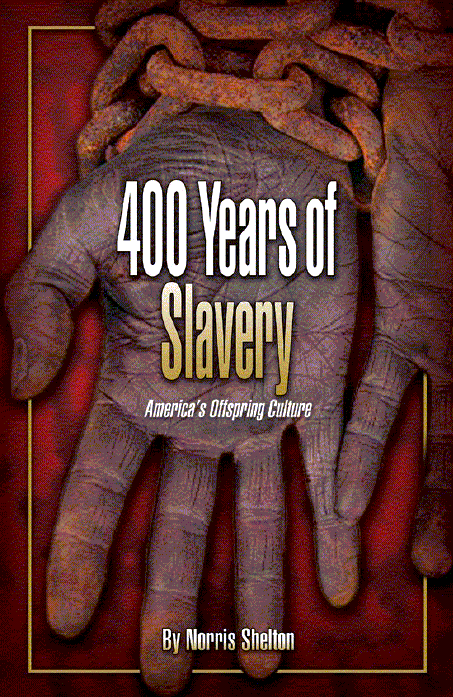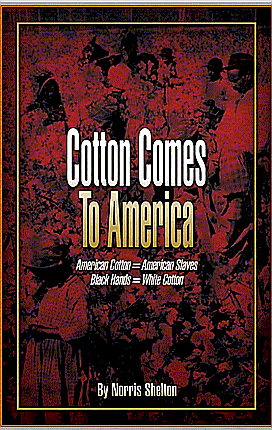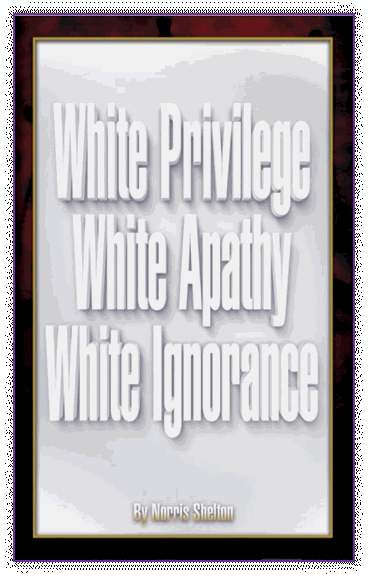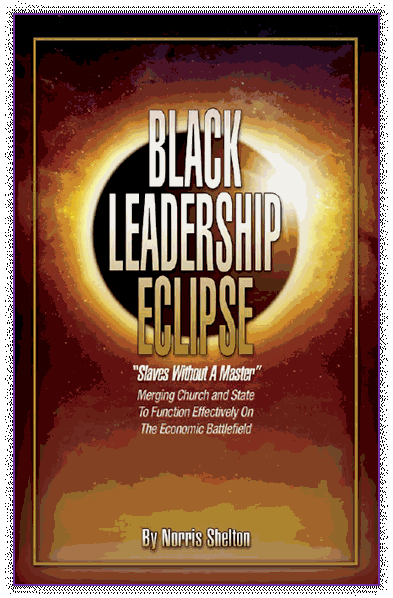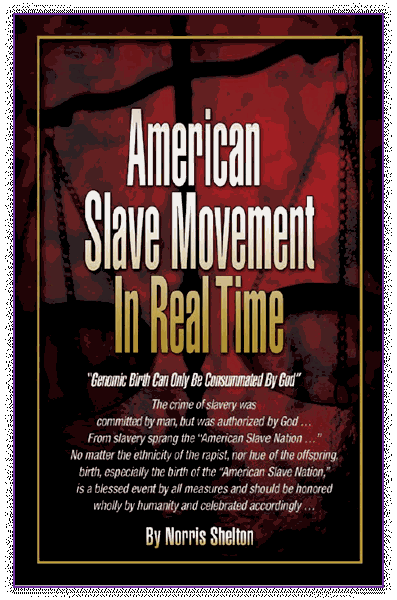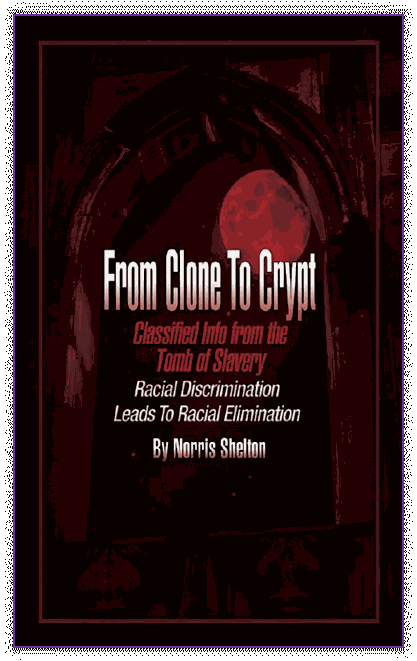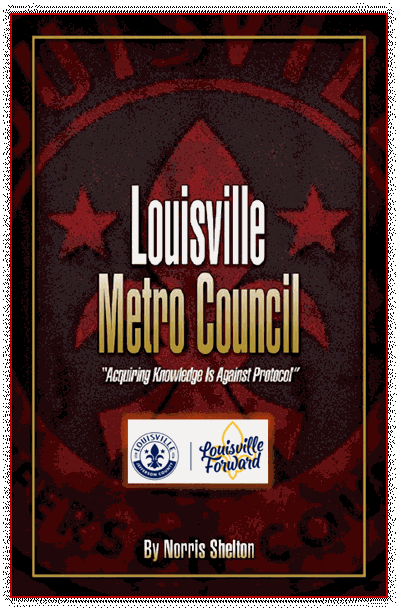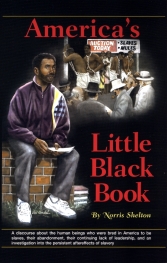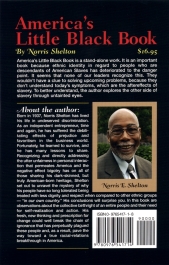| |
|
American 2100 West Muhammad Ali
Blvd.,
| ||||||
| Click on either of the above
images | |
Malignant
Indifference to Slave Heritage Continues
To Overshadow the Future of Black Americans
Louisvillian Norris E. Shelton published his first literary work, America’s Little Black Book, in 2005. The book addresses the continuing, troubled journey of the descendants of American slaves. His first work is the result of a personal epiphany, a spiritual flash that radically changed the way Louisville small businessman Shelton, now 71, views his own ethnic identity and that of others who share his heritage.
His conclusions provide a fresh look at the debilitating effects of prejudice and favoritism in the business world — and offer his prescription for change through collective self-realization and action. The birthright of an entire people is at stake.
In Shelton’s own words, “I have had a diverse career in pursuing and achieving, to a great degree, the American dream. Several years ago, I began searching for an avenue through which to share what I, a black man, have learned in my climb from poverty to prosperity and personal success.
“Since there is so much unrest in our inner cities, and because the prognosis is so bleak for a majority of our inner-city people, I spent almost a decade studying the causes and formulating a proposed cure for this persistent, debilitating condition. The truth: We have a dearth of leadership. Our so-called, largely self-anointed ‘black leaders’ are adrift because of a basic flaw: They don’t seem to comprehend — or are unwilling to admit — our true heritage as descendants of American slaves.” Shelton shares his own racial awakening, and his frank observations are presented in America’s Little Black Book.
“I am an American, born and bred, but, like millions of others, I have had to deal with undeserved discrimination in America — our own land!” laments Shelton. “Much of our people’s plight can be traced to our being unwilling or unable to truly appreciate and embrace our own unique heritage.
“It is not a benign neglect: Rather, Americans have developed a malignant indifference toward the inherited injustices that stem from slavery, even though the lingering aftereffects still plague our homeland today. I am a second-class citizen in my own country — the land of the free!”
Shelton believes a fresh perspective on racial issues could help pave the way for the advancement of an entire nation of abused people. His fondest hope is that his book could provide momentum for the descendants of American slaves in achieving, “a revitalization of our quest for true freedom, a renewal of the dream of an entire people!”
Printed in Louisville, the 328-page book is published under the auspices of American Slaves, Inc., an organization whose mission is to facilitate the efforts of the descendants of American slaves to overcome the persistent aftereffects of slavery by educating the descendants of slaves as to who they are and the benefits of being who they are. America’s Little Black Book is available in paperback (ISBN: 0-9765417-1-8), at $16.95, as well as in hard cover (ISBN: 0-9765417-0-X), at $26.95.
In the Louisville area, the book can be found in select bookstores, including Borders Books & Music, Carmichael’s Bookstore, A Reader’s Corner and Brownsboro Books. Or, simply order online by clicking one of the two Buy Now buttons below (paperback or hard cover):
# # #
America's Little Black Book
by Norris Shelton
|
America's Little Black Book |
Or select:
America's Little Black Book |
Shelton's second book:
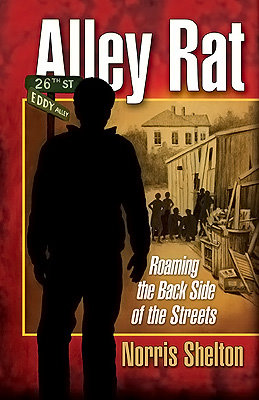
Alley Rat
Roaming the Back Side
of the Streets
"Alley Rat" reminds us of the deep human need for a sense of place ...
... no matter how dire the circumstances.
“The mass of men lead lives of quiet desperation and go to the grave with the song still in them,” wrote Henry David Thoreau in “Walden.” There are others, however, who virtually scream aloud as they speed down life’s emergency lane, oblivious as to where they are headed, but in a reckless, all-fired hurry to get there, all the same. Most of us, comfortably or not, fall somewhere in between, but Norris Shelton is a genuine screamer. “Alley Rat” is his story.
Born in Tallapoosa, Georgia, in the late ’30s, the author was part of a large colored family. His parents were poor and uneducated yet convinced there were better times ahead and were determined to seek a better life for their brood. To break away from the insufferable conditions they live under in the Deep South, the family stealthily flees their rural subsistence
in search of a quite modest American dream: to live and let live. As migrants often do, the Sheltons gravitate to the back streets of the slums, not by choice, but because that’s where they find the only affordable housing for the almost penniless clan. Yes, there will be much more opportunity in the city of Louisville, Kentucky — a real chance for success, but also for collapse.Inheriting a legacy of poverty and perplexity, and often on the wrong side of the law, the author, a self-proclaimed
alley rat, starts out not believing in much of anything; he has little hope for a bright future, and, predictably, stumbles into and out of trouble, at home and abroad.At the age of 16, the streetwise young maverick is already a two-fisted, hard drinking skirt chaser. Violence and mayhem have become the norm in his daily life in the city. Cursed with a violent temper, one night he has a fit of anger, breaks his girlfriend’s neck, and takes flight out of state, evading a warrant for attempted murder. It’s the beginning of a marathon run that has him continually glancing over his shoulder.
Living under cover with the police never far behind, eventually he evades civilian authorities by enlisting in the Army. For more than two years, he blunders into and out of trouble, loan-sharking, bootlegging, getting into fistfights, going AWOL, drinking too much, and raising all kinds of off-duty hell. At his post, though, he is the model enlistee, emerging as a highly-skilled American soldier. He learns to love the Army, but the Army views him as a seething, die-hard rebel.
During a tour overseas, he initiates an escapade he deems to be a just crusade for racial equality: He instigates a race riot that results in all military personnel throughout Germany being restricted to base for weeks. When restrictions are ultimately lifted, Shelton and his sidekick — still under suspicion for being ring leaders of the turmoil — are denied passes. Defiant and emboldened, they go AWOL and start an altercation that escalates into pandemonium and leads to a nightclub being burned down. Both cool their heels a long spell in the stockade. Ultimately, even the Army has had enough and drums him out with a court-martial. While this run is over, an old chase resumes.
Back in civilian life in his hometown, the author begins singing for a local band in popular Louisville area bars. Now in the spotlight, he is surrounded by women, and the chase is on again — but with a mind-boggling twist: Forever the aggressor, he discovers he’s now the prey! Becoming the hunted, not the hunter, he learns, is a startling role reversal. Nonetheless, it’s a wake-up call that leads him to taking time for introspection.
As the story rumbles along, Shelton
experiences an epiphany about his “Alley Rat”
mentality. In due course, he is arrested on the long-standing, attempted
murder charges. Has he come full circle, or is this just another of the
countless laps of the extended rat race? To fully understand what the author
sees when, at long last, he takes a profound personal look in the mirror,
we need to jog alongside this intractable
runner as he retraces his life through
the pages of “Alley Rat.”
“Alley Rat”
is the second literary work by Louisville businessman/author Norris E.
Shelton. Released in 2007, the 376-page book is published under the auspices
of American Slaves, Inc., an organization whose mission is to facilitate the
efforts of the descendants of American slaves to overcome the persistent
aftereffects of slavery by educating the descendants of slaves as to who
they are and the benefits of being who they are.
“Alley Rat”
is available in hard cover (ISBN: 978-0-9765417-2-1) at $26.95. Ask for it
at your local bookstore, or call (502) 939-6688
to order a copy. Or, simply order online by clicking the Buy Now button
below:
TThird book:
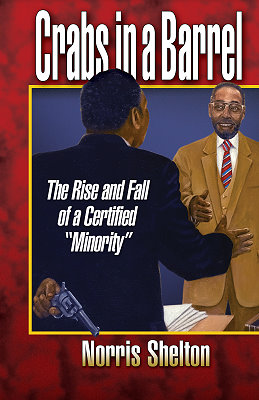
Crabs in a Barrel
As we delve into the pages of
Crabs in a Barrel, we wince at his pain when the hurdles are too
high, and he falls face down. Real estate brokers laugh in his face; bankers
rebuff him; government officials are deceiving; contractors abscond with
precious capital, and business partners undercut and even swindle him.
Kickbacks, bribery and other forms of corruption and treachery are facts of
life. While government “minority” funds promise salvation, devilish strings
are always attached. Yet, despite the treachery and deceitfulness of
strangers, it is his closest friends and associates who continually trip up
this resolute entrepreneur. Now 71 and reflecting on his checkered career,
the Louisville, Kentucky, businessman jokingly claims his early business
tenure “serves as a warning to others.” But what the once naïve entrepreneur
lacked in ingenuity and training, he made up for with gritty resolve and,
yes, he did learn from his youthful blunders and misplaced trust.
“It others can learn from my mistakes,” says Shelton,
“then sharing the lowest moments of my business nightmares can be a positive
contribution to my brethren who consider entering the business arena.
Looking back, I was building sand castles on the beach, and the tide just
swept them away. I learned the hard way; now I want to spare other
descendants of slaves — my people —that same plight.”
Crabs in a
Barrel should be required reading, not only for slave descendants and
other minorities, but all of those — associates and competitors, advisors
and investors, regulators and officials — who have an impact on those who
venture to take a chance by chasing the American dream.
Crabs in a Barrel, a 284-page work, is a hardback, published in February 2008 by American Slaves, Inc. The ISBN Number is 978-0-9765417-4-5. It lists for $26.95.
Fourth book:
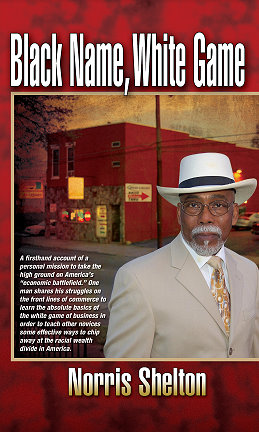
Black Name, White Game
While having published
three other books, businessman/author Norris Shelton maintains, “This is
truly what I set out to write about, all along. It centers on a wake-up call
I experienced. It took me a lifetime to discover the truth, and I am eager
to spread the word.” Black Name, White Game
is the gospel according to Norris Shelton.
In essence, Black Name, White Game has a two-pronged message. “In my own
lifetime, we’ve been called Colored, Negro, Black and, lately, African
American,” notes Shelton, “not to speak of the many disparaging names.
Dual-national labels are usually reserved for first-generation American
immigrants, whose American-born children typically cast aside the moniker and
simply blend in.
The ‘great melting pot’ has its shortcomings. My ancestors were slaves, born
and bred in America for generations, yet my people have an ethnic qualifier in
our collective designation. Will my great granddaughter still be an ‘African
American’ as an adult, or will our ethnic name change still again? How long
must we wait to be full-fledged Americans? We trace our family origin to rural
Georgia, not another continent. We are born and bred Americans — many
generations strong and counting.
”Inspired by the teachings of the Rev. Dr. Martin Luther King Jr. in the late
1960s that the next phase in the march for civil rights must entail strides on
the “economic battlefield,” Shelton, unschooled, underfunded and ill-prepared,
felt compelled to enter the business arena, though it was clearly a white
game. “When an Army takes a hill, it’s the foot soldiers, ready or not, who
lead the charge.”
Far from taking the business world by storm, Shelton was, at every turn
“harshly ridiculed, boldly insulted, openly disrespected, rudely rebuffed and
often shown the door.” Much to his surprise, like Walt Kelly’s cartoon
character Pogo, who declared, “We Have Met the Enemy — and He is Us,” Shelton
discovered that his worst enemies were those perceived to be his friends. “I
expected the white establishment to be a hard sell, but to be picked clean by
my own brethren?” He pressed on regardless. We can all learn from his mistakes
as he recounts the highs and lows of an independent businessman in Black Name,
White Game.
“Our mission is clear: If my people, the descendants of American slaves, are
ever to achieve first-class status in the pursuit of the American Dream, we
must level the economic playing field. We must bridge the economic divide. For
too long, it’s been a preponderantly white game. The ‘devil is in the
details,’ but we must persist, ill-equipped and unprepared though our people
may be. Our marching days may be behind us, but we still have a struggle to
establish an equal opportunity society in this nation. The need for economic
progress is paramount. It’s time for taking care of business.”
Black Name, White Game, a 208-page work, is a hardback, published in July 2008 by American Slaves, Inc. The ISBN Number is 978-0-9765417-5-2. It lists for $26.95.
Fifth book:
American Slaves Inc. Renaissance Plan
The Next Step Forward
By Norris Shelton
The aftereffects of slavery have been growing
in America since the end of corporal slavery. This unstable influence is
seemingly encouraged to fester unimpeded. Because of misplaced shame, openly
discussing slavery
is painful to many and a taboo topic even in circles where dialogue is necessary
to ensure the stability of our country. If allowed to worsen, simmering racial
discontentment could turn into a crisis.
It is the goal of American Slaves, Inc. to help remedy the situation and work to ensure a peaceful coexistence between Descendants of American Slaves and other American cultures. Here's our plan:
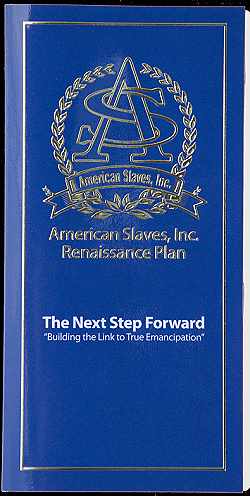
|
|
|
|
|

